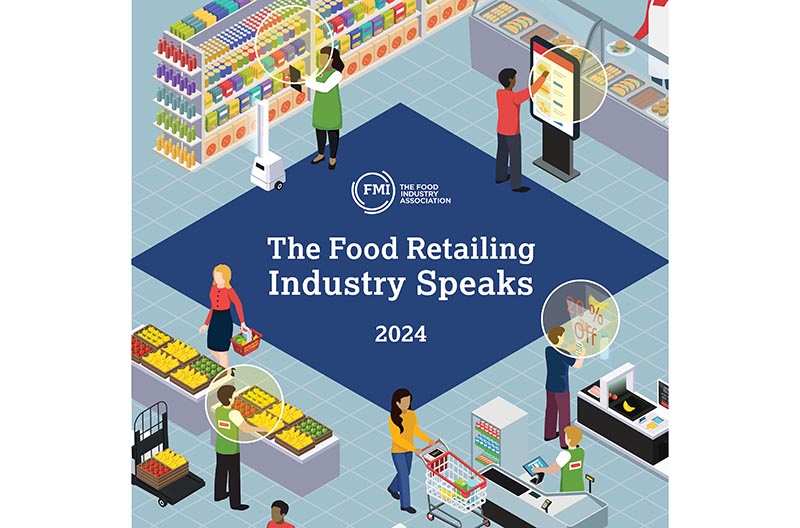The food industry is instituting innovative strategies to modernize the grocery shopping experience while dealing with increasing asset protection concerns and inflationary challenges, according to FMI – The Food Industry Association’s annual research analysis “The Food Retailing Industry Speaks 2024.”
The 75th annual report surveyed food retailers’ and suppliers’ 2023 developments and expectations for the year ahead, finding that while the industry made key strides in addressing longstanding labor and transportation capacity issues, inflation and other financial hurdles caused industry profit margins to fall to pre-COVID-19 pandemic levels.
“The food industry continues to demonstrate its collective resilience and adaptability in solving persistent transportation and employee turnover issues so it can focus on operational efficiencies,” said Leslie G. Sarasin, FMI president and CEO.
“Inflationary pressures and other challenges continue to squeeze profit margins, but even these obstacles do not stop the industry from its investment commitments to sustainability, emerging technologies, and marketing and modernization strategies that improve the in-store shopping experience.”
The report found large operational improvements across the board. Both retailers and suppliers reported significant declines in the negative impacts of supply chain and transportation capacity issues that have plagued the industry. The percentage of retailers emphasizing negative impacts from trucking/transportation challenges declined from 79 percent to 35 percent, while suppliers noted a decline from 72 percent to 58 percent.
By addressing these persistent supply chain issues, retailers also reported a dramatic drop in out-of-stock rates, falling from 10.7 percent in 2022 to 6.5 percent in 2023, which is even lower than the typical historic rate of 8 percent.
Retailers and suppliers report employee retention, another persistent hot-button issue for the industry, improved in 2023. Food retailers and suppliers offered more positive feedback about their ability to recruit and retain quality talent, with average turnover rates for food retail employees falling slightly from a historic high of 65 percent in 2022 to 58 percent last year.
As supply chain, transportation and labor pressures eased, the No. 1 challenge currently facing the industry has become asset protection, with 85 percent of food retailers citing increasing theft and fraud as the biggest problems negatively affecting business. Additionally, two-thirds (64 percent) of retail respondents cited societal challenges, including a lack of civility, drug use and violence, as issues that negatively impact operations. However, despite these concerns, FMI’s Asset Protection Survey found that more than 80 percent of retailers have plans in place to address many of these challenges.
Retailers and suppliers also note the negative impacts of inflation and the increasingly complex regulatory environment on net profits. Food retailer profit margins fell from 2.3 percent in 2022 to pre- COVID- 19 pandemic levels of 1.6 percent in 2023. Both retailers and suppliers anticipate that operating costs will increase in 2024, leading just 13 percent of food retailers to believe their profits will increase this year. Sixty-five percent of retailers also expressed concerns that inflation and economic challenges will change shopper behaviors.
Yet this murky economic outlook is not preventing investments in innovative strategies to improve customer experience and increase growth. Top initiatives include experimenting with in-store technologies to enhance the shopping experience (81 percent). Retailers are also responding to changing consumer habits by increasing in-store space for freshly prepared grab-and-go items (79 percent) and carrying more private brand items (67 percent) and locally sourced foods (57 percent).
Technology is also playing a bigger role in the grocery shopping experience, with 41 percent of food retailers and 69 percent of food suppliers reporting using artificial intelligence (AI) for parts of their businesses – the retailer usage percentage nearly doubling year over year. Food industry companies are often using AI for assortment planning and replenishment, as well as supply chain logistics.
[RELATED: Report: Grocery Execs Believe AI ‘Will Be A Future Necessity’]

